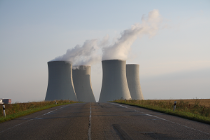As the global energy sector reconsiders the place of nuclear in the power generation portfolio, all eyes ought to be on the recent deal to construct the United Kingdom’s first new nuclear plant in decades, especially after analysts at stockbroker Liberum Capital said government commitments to French company EDF will make Hinkley Point the most expensive power station in the world. The plant in Somerset is set to cost £16 billion, and will provide enough power to supply 7 percent of Britain’s homes for the next 60 years.
Hinkley Point Nuclear Power
The Hinkley deal is pivotal to Britain’s plans to keep the lights on while meeting the UK’s carbon reduction targets and lessening dependence on imported fossil fuels. But there are concerns that renewed global support for nuclear energy will place further burdens on consumers already hit by rising household bills. The large capital projects will be even more costly if enterprise project management (EPM) practices and technologies are not in place to control costs before they spiral out of control.

For Britain, the Hinkley Point construction project promises a number of benefits … cleaner energy, 25,000 new jobs and financial savings as the cost of fossil fuels is predicted to increase by the time the plant is commissioned in 2023. The energy sector as a whole should watch how EDF and its partners manage the project risk and the asset data associated with the project. Similar projects are underway now in China, Belarus, Turkey and Argentina, and five new reactors are under construction in the United States. Our legacy nuclear power plants are nearing or well beyond the end of their expected lifecycles. What lessons have we learned over these decades that can be applied to planning new projects? How can we plan projects to balance safety and cost? How can project owners ensure contractors keep their budget and timeline commitments?
These are important questions since there is already speculation that UK taxpayers could be faced with an annual bill of £1bn to subsidize Hinkley if wholesale electricity prices fall below the price the government has guaranteed EDF. Meanwhile, the nuclear plant EDF is building in northwest France has been plagued by cost overruns and delays.
Building a nuclear plant involves a huge number of business processes from design, manufacture and fabrication/construction, to maintenance, operation, supply chain management and, somewhere down the line, safe decommissioning. Given that certain elements of the project cannot be compromised for environmental and safety reasons, there are multiple opportunities for delays and cost increases to occur.
Given the hostile environment that EDF and partners China National Nuclear Corporation and China General Nuclear Power Corporation are operating in, it is crucial that the development process is well managed to minimize additional costs and ensure real-time collaboration with all stakeholders. With projects lasting on average 30 to 40 years, changes in scope need to be well defined, risk must be assessed and all cascading effects of project changes must be understood and managed.
This level of overarching enterprise project management can only be achieved with an integrated business solution that manages the entirety of asset and contract lifecycles. This yields complete visibility across asset design, equipment procurement, manufacturing, construction/fabrication, installation and erection, commissioning, maintenance and service, spares and supply chain, refurbishment or lifecycle extensions and decommissioning. IFS Applications, in this regard, may be unique in that it supports the entire asset lifecycle within one core application. This is in keeping with the requirements of standards like PAS-55 and ISO 55000, designed to protect the interests of asset stakeholders. These standards mandate that asset data be kept in a single database across the entire lifecycle of the asset, regardless of who is using that asset data or how they are using it.
IFS was originally conceived as a computerized maintenance management system (CMMS) at a nuclear power station in Sweden and continues to work with a number of plants such as OKG, Barseback, and SkB. Even today, IFS Applications is being used to construct one nuclear power plant in Argentina and to operate a sister plant, even as it is being used to decommission a nuclear power plant in Sweden. IFS provides reliable software technology to help these organizations manage the entire lifecycle of contracts and assets, from design to maintenance, repair, operation, waste management and decommissioning.
In all of these projects, project management is about more than cost control – it is about asset integrity management and risk management. Project details must be recorded for critical health, safety and environmental (HSE) reasons, and managed across decades of the asset lifecycle. In this industry, an integrated approach across the entire lifecycle is needed to reduce the risk of cost overruns or project failures that can lead to environmental catastrophe.